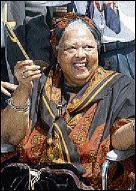Mel Cooke, Freelance Writer

The late Honourable Louise 'Miss Lou' Bennett-Coverley. - File
After Jean 'Binta' Breeze read her first poem at the Undercroft of the Senate Building, University of the West Indies (UWI), Mona campus, on Thursday night, she smiled and said "to come to a poetry reading sandwiched between Mutabaruka and Linton Kwesi Johnson, what more could a woman want?"
And before Johnson started, he noted that he was always put to read after Breeze. "It is a formidable task to follow Jean Binta Breeze," he said. To that she humorously called from the audience "you can do it if anybody can".
The night's poetry session, hosted by Winston 'Bello' Bell, was part of the 'Noh Lickle Twang' conference on Louise 'Miss Lou' Bennett-Coverley and Breeze referred to not only Mutabaruka's poetry, but the work he did with Miss Lou. Breeze said "the first time I met Miss Lou was when Mutabaruka took her to the studio to do 'Dutty Tuff'. She was sitting there, fanning and wondering if she could do it. We said yes man, yu have de riddim. I asked what can I get for you and she said "a likkle water". What an honour it was, simply to bring Miss Lou some water".
"I like how Mutabaruka said she was the first dubber," Breeze said.
Breeze also gave a little of her history in poetry, saying that her mother started teaching her poems very early and at six years old she was entered in the Jamaica Cultural Development Commission's (JCDC) festival competition. "I don't know if there was any of my generation who never knew a Miss Lou poem by heart," she said.
For that JCDC event, Breeze did Miss Lou's 'Call Me Bredda'. "I knew it when I was six and I never forgot it," Breeze said, before doing the poem with emphasis and expression.
Great joy
"It was a joy doing Miss Lou. She travel all over the world with me," Breeze said, noting that after Miss Lou died she travelled through several cities in the U.K., doing Miss Lou's poems.
Breeze did 'The Arrival of Brighteye', a poem speaking to the Windrush generation through the migration of a seven-year-old girl to rejoin her mother in England, the spoken stanzas interspersed with sung lines. Breeze read from the final movement in her latest book, The Fifth Figure, and there was applause after the first line of her last poem on Thursday evening, 'Riddym Ravings'.
"Well, I'm from England as you can tell by my dress," Johnson said to laughter, a brown jacket and red tie among his attire. And there was applause when he said "dem get me outta Jamaica, but dem coulden get Jamaica outta me".
"I had the pleasure of meeting Miss Lou on a couple occasions and I was taken aback by her generosity of spirit," Johnson said. "With the exception of Marcus Garvey, I can't think of any other Jamaican who has made a greater contribution to the decolonisation of the minds of Jamaicans."
Ethnic cleansing
He gave some of his own history in poetry before reading from his collection 'Mi Revalueshanary Fren'. He held up a hand to put the applause on pause, saying he preferred it at the end, through 'It No Funny', 'Sonny's Letter' (which he termed the poem for which everyone in Jamaica knows me), 'Reggae Fi Dada', 'Tings an' Times', 'Hurricane Blues' and 'Reggae Fi Bernard', the poems preceded by extensive introductions.
Johnson closed with 'New World Order', saying that he had a problem with the term 'ethnic cleansing', as it implied that there was 'ethnic purity'.
"For me, the term represents the language of dehumanisation and the dehumanisation of language," he said.
And Bell noted that humanity was central to all the poems presented that night.
"To me, as a pastor, it was like church," he said in summing up the evening of poetry in honour of Miss Lou.

